BRICS group name Pakistan-based terrorists in declaration highlighting concerns on extremist violence
September 5, 2017 by admin
Filed under Choosing Lingerie
In a strong endorsement of India’s stand, the five-member BRICS group on Monday issued a declaration that for the first time that highlighted its shared concerns on terrorism emanating from Pakistan-based terror outfits.
The Xiamen declaration stopped short of naming Pakistan but listed specific terror organisations based there, in a message surprisingly backed by host China, despite its past diplomatic shielding of its ‘all-weather’ ally from global pressure on terror.
This came as Prime Minister Narendra Modi highlighted the scourge of terror in an intervention at a summit meeting of the five leaders, which opened in the beautiful seaside city of Xiamen on Monday morning.
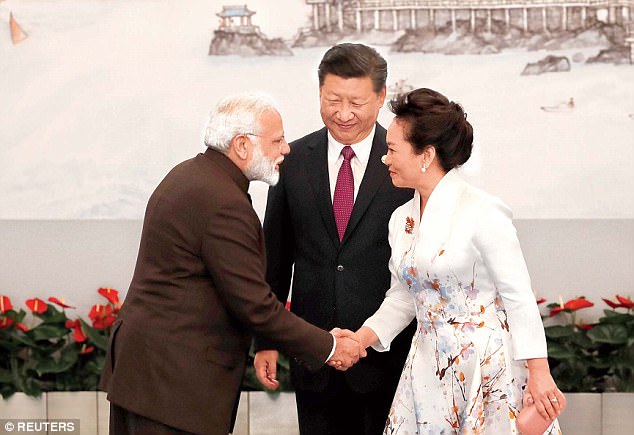
Chinese President Xi Jinping and his wife Peng Liyuan greet Indian Prime Minister Narendra Modi before the welcoming banquet for the BRICS Summit, in Xiamen, China
The 30-page declaration, running into nearly 7,500 words, expressed concern on violence caused by ‘the Taliban, ISIS, al- Qaida and its affiliates, including Eastern Turkistan Islamic Movement, Islamic Movement of Uzbekistan, the Haqqani network, Lashkar-e-Taiba, Jaish-e- Mohammad, Tehrik-i-Taliban Pakistan (TTP) and Hizb ut- Tahrir.
‘This is the first time that it has listed specific organisations,’ Preeti Saran, secretary (East) in the ministry of external affairs, told reporters. The declaration also called for ‘increasing the effectiveness’ of United Nations designations of terror groups.
Whether this will see a change in China’s stand at the UN Security Council, where it has for more than a year blocked India’s application to list JeM chief Masood Azhar, remains to be seen.
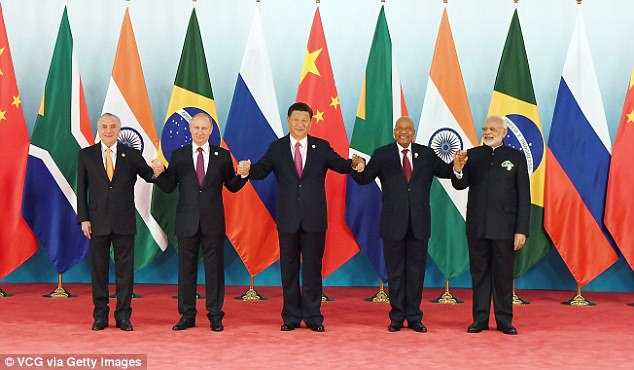
(L-R) Brazil’s President Michel Temer, Russian President Vladimir Putin, Chinese President Xi Jinping, South Africa’s President Jacob Zuma and Indian Prime Minister Narendra Modi pose during the BRICS Summit at Xiamen International Conference and Exhibition Centre
Chinese foreign ministry officials couldn’t confirm if this would signal a change in China’s approach when the listing is reviewed next month.
The declaration also implicitly backed India’s stand on its accession to the Nuclear Suppliers Group, stressing the need for a predictable environment for access to civilian nuclear technology and financing.
The BRICS leaders met amid global attention on North Korea following its sixth nuclear test on the eve of the summit.
The declaration said the countries ‘strongly deplore’ the test, but also echoed China’s view that the Korean peninsula nuclear issue ‘should only be settled through peaceful means and direct dialogue of all the parties concerned’.
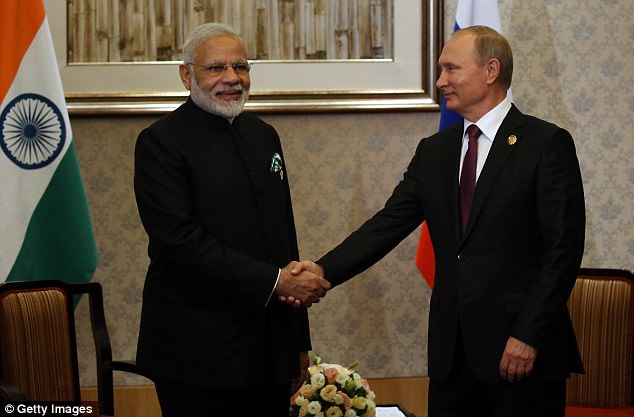
President Vladimir Putin (R) shakes hands with Indian Prime Minister Narendra Modi (L) during their meeting at the BRICS summit on Monday
Earlier on Monday, the PM called on the BRICS countries to step up their economic cooperation and described the five emerging nations as a source of stability in an increasingly uncertain world.
The PM also highlighted India’s fight against black money and corruption, and a later BRICS business council meeting, said the GST reform was India’s ‘biggest economic reform measure ever’ and had ‘in one stroke created a unified market’.
The PM also spoke of programmes like Digital India, Start Up India and Make in India.
The summit concluded with several outcomes on boosting economic and financial cooperation, including credit ratings under the BRICS interbank cooperation mechanism and an interbank local currency credit line.
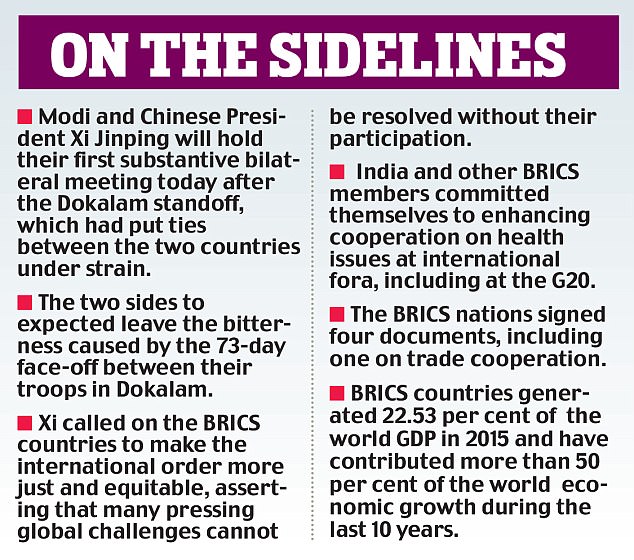
The PM held bilateral talks with Russian President Vladimir Putin and Brazil President Michel Temer. Modi will also hold a meeting with the President of Egypt, which is among the five counties – Mexico, Guinea, Thailand and Tajikistan – invited by China as part of ‘BRICS Plus’ outreach exercise.
His last engagement is a bilateral with President Xi Jinping before he flies out for Myanmar on Tuesday afternoon.
India and China look for a new chapter of mutual accord
As Prime Minister Narendra Modi arrived on a rainy Sunday evening in the picturesque Chinese coastal city of Xiamen, Chinese officials said they hoped his bilateral meet with Chinese president Xi Jinping would open ‘a new chapter’ in ties.
Modi and Xi are set to meet on Tuesday morning following the Sunday’s BRICS Summit, and both sides are looking to turn the page after the 72-day stand-off at Doklam.
Modi was welcomed at Xiamen airport by Chinese Assistant Foreign Minister Kong Xuanyou and the Chinese envoy to India Luo Zhaohui.
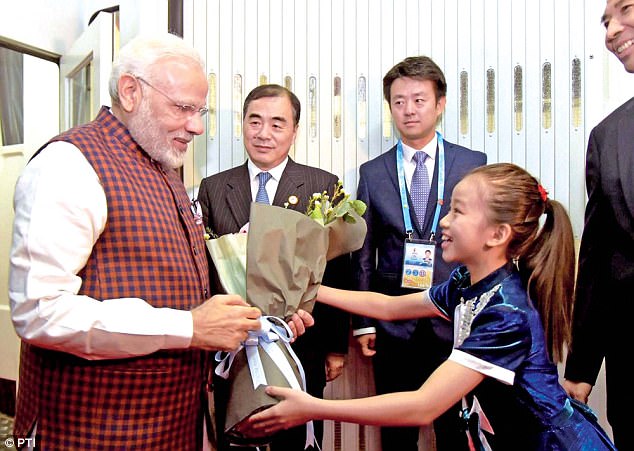
Modi was welcomed at Xiamen airport by Chinese Assistant Foreign Minister Kong Xuanyou and the Chinese envoy to India Luo Zhaohui
Due to heavy rain, the PM embarked not from the usual stairs but through an aerobridge.
Ahead of the PM’s arrival, Luo, the Chinese envoy, ‘expressed his hope that China and India could open a new chapter in the development of bilateral relations taking the forthcoming 9th BRICS summit as an opportunity’, the State-run Xinhua news agency quoted him as saying.
Luo said ‘frequent interactions’ between the two leaders – Xiamen will host their ninth meeting – had ‘greatly pushed forward pragmatic cooperation’ and ‘enhanced political mutual trust’.
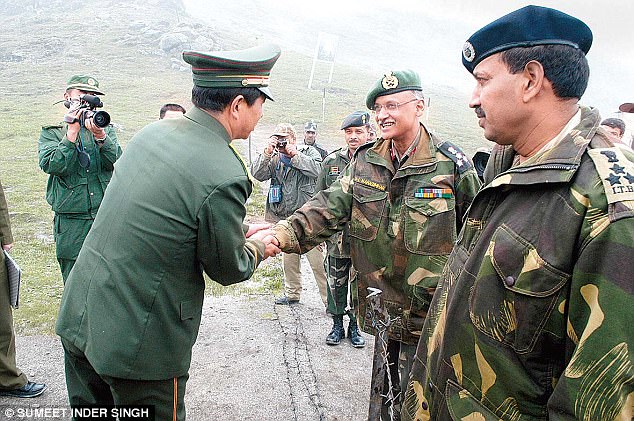
Handshakes at dawn: The damage the 10-week troop Doklam standoff inflicted on the already frayed India-China relationship will not be easy to repair
Modi will attend the opening of the BRICS Summit today, and over the two days in Xiamen, will also hold several key bilateral meetings before he leaves for Myanmar on Tuesday afternoon.
Besides Xi, the PM will meet with Russia’s president Vladimir Putin, as well as the presidents of Egypt and Brazil, and K.V. Kamath, the president of the BRICS New Development Bank.
The end of the Doklam stand-off ahead of the BRICS Summit has been a source of relief for Beijing, which did not want to see the summit get overshadowed.
Beijing had in the lead up to the summit toned down its sharp rhetoric. At the same time, certain hawkish sections of the press have called for Beijing to not play down the row and to celebrate what they call their ‘victory’.
-
 Expert calls for ‘sanity and vision’ from both India and…
Expert calls for ‘sanity and vision’ from both India and…
 ‘India’s refusal to bend showed the world how to deal with…
‘India’s refusal to bend showed the world how to deal with…
 ‘Both want to be superpowers’: China and India set to meet…
‘Both want to be superpowers’: China and India set to meet…
 Doval delivers in Doklam: Modi’s team find peaceful solution…
Doval delivers in Doklam: Modi’s team find peaceful solution…
‘The settlement of the Doklam was undoubtedly a victory for China after it pressured India into ending its speculative tactical intervention in the border region via military, diplomatic and other means,’ said a commentary in the Global Times.
‘It was a comprehensive demonstration of China’s major-country strategy, and the wisdom and the ability of the Chinese leadership. It is no less significant than the armistice of the Korean War (1950-53), or the conclusion of the 1979 China’s self-defence war against Vietnam, especially given its peaceful resolution.’
‘In this instance,’ the commentary added, ‘China’s concerns that playing tough with India could have jeopardised the BRICS Summit, may instead have bolstered New Delhi’s arrogance and paved the way for it to create a scene for China at the summit.’